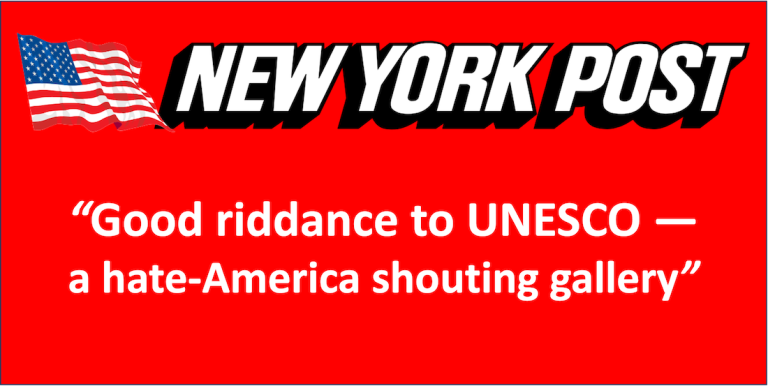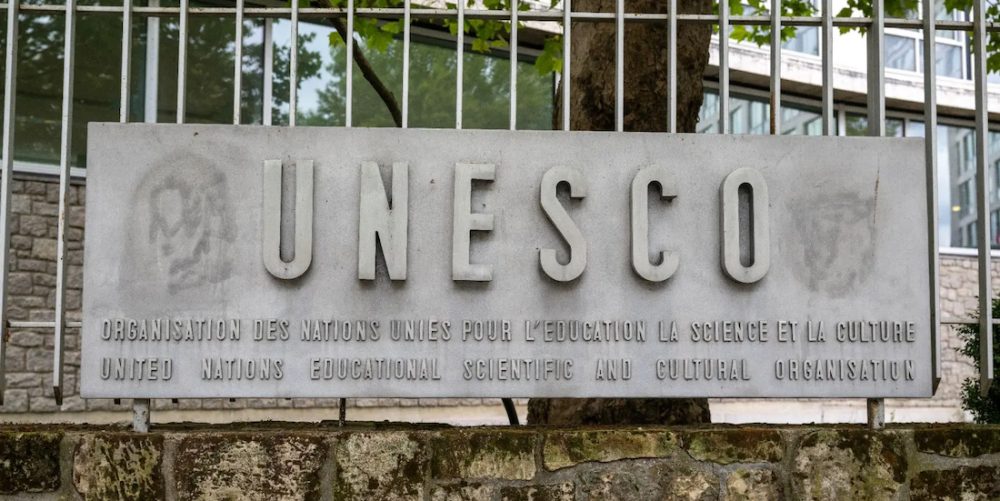
By the Staff of The Stewardship Report:
Countering divisive narratives with facts and context
New York, N.Y. – The New York Post’s July 27, 2025, opinion piece, “Good riddance to UNESCO — a hate-America shouting gallery,” celebrates the U.S. withdrawal from the United Nations Educational, Scientific and Cultural Organization (UNESCO) as a triumph of national sovereignty.
It frames UNESCO as a “woke” bureaucracy pushing anti-American agendas. This narrative, steeped in inflammatory rhetoric, distorts the agency’s mission and ignores its global contributions.
The Anti-Post, launched by The Stewardship Report, counters this with reason, evidence, and a commitment to truth. We dissect who is behind this decision, what UNESCO does, when and where the withdrawal occurs, and why this move harms global cooperation.

What UNESCO Really Does
UNESCO, founded in 1945, promotes peace through international cooperation in education, science, culture, and communication. It designates World Heritage Sites, like the Grand Canyon and Statue of Liberty, preserving humanity’s shared legacy.
It supports literacy programs, combats hate speech, and advances Holocaust education to fight antisemitism. Contrary to the Post’s claims, UNESCO’s work is not about imposing ideologies but fostering dialogue and mutual understanding across nations.

Who Drives the Withdrawal and Why
The decision to exit UNESCO, announced July 22, 2025, by the Trump administration, reflects an “America First” policy skeptical of multilateral institutions. The White House cites UNESCO’s alleged “divisive social and cultural causes” and its 2011 admission of Palestine as a member state, claiming it fuels anti-Israel rhetoric.
Yet, UNESCO chief Audrey Azoulay notes that political tensions have eased, and the agency has brokered consensus on issues like Holocaust education. The Post’s portrayal of UNESCO as a globalist threat oversimplifies a complex decision, ignoring how withdrawal weakens U.S. influence while empowering competitors like China, now a leading funder.

When and Where This Unfolds
The U.S. withdrawal, effective December 31, 2026, was formalized at UNESCO’s Paris headquarters. This marks the third U.S. exit, following departures in 1984 and 2017, with rejoining in 2003 and 2023.
The Post frames this as a decisive break from a flawed institution, but UNESCO’s diversified funding—U.S. contributions are now just 8% of its budget—means the agency is prepared. The real loss is to U.S. communities seeking World Heritage status or educational partnerships, and to global initiatives reliant on American leadership.

Why This Matter
The Post’s triumphalism obscures the stakes. UNESCO’s programs, from protecting cultural heritage in war zones to advancing science for sustainable development, require global cooperation.
Withdrawing isolates the U.S., reducing its voice in shaping international norms. China’s growing influence within UNESCO—evident in education and artificial intelligence initiatives—fills the void, potentially aligning global standards with its interests.
The Post’s focus on “woke” buzzwords distracts from this strategic misstep. Moreover, accusing UNESCO of anti-Israel bias ignores its balanced efforts, including agreements with both Israel and Palestine over the past eight years.
The Anti-Post rejects sensationalism for clarity. We challenge the Post’s narrative not to silence it but to elevate discourse. UNESCO’s mission aligns with values of empathy, reason, and global citizenship—values the Post dismisses as globalist.
By exiting, the U.S. risks ceding moral and strategic ground. Readers deserve context, not caricature.
Let this be your act of resistance—not through yelling, but through clarity. Not with conspiracy, but with conscience.
#AntiPost #UNESCOTruth #GlobalCooperation #TheStewardshipReport #CounterNarrative
Tags: UNESCO, New York Post, Trump administration, global cooperation,
Anti-Post, cultural heritage, education, science, World Heritage Sites, truth-telling
Summary for audio (75 words)
The New York Post cheers the U.S. exit from UNESCO, calling it a victory against “woke” globalism. The Anti-Post counters this divisive narrative, highlighting UNESCO’s vital work in education, science, and cultural preservation. The U.S. withdrawal, effective December 2026, risks weakening global cooperation and empowering rivals like China. We call for reasoned discourse over sensationalism, urging readers to value UNESCO’s mission for peace and progress.